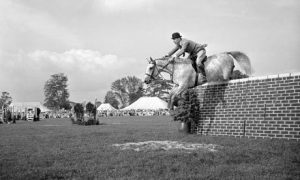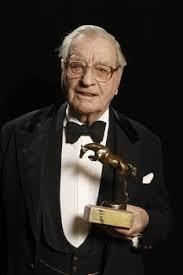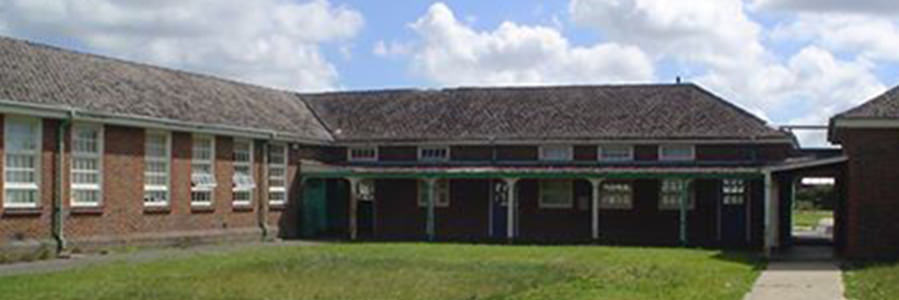 Douglas Henry David Bunn 1928-2009
Douglas Henry David Bunn 1928-2009Douglas Henry David Bunn was born on February 29 1928, the son of a wholesale fruiterer in Sussex. He was educated at Chichester High School from 1939 and 1946 and Trinity, Cambridge, where he played rugby for the varsity but was disappointed not to have got his “blue”. After leaving Trinity he was called to the Bar at Lincoln’s Inn, practising as a barrister from 1953 to 1959. His show jumping career already under way, he would sometimes appear in court dressed in breeches and riding boots beneath his gown.
He had loved horses since, at the age of four, he had been put on a pony called Billy Boy; when it threw him through a sheet of glass. Douglas, far from being put off, went back for more initially galloping along the beach at Selsey where he grew up. He was 10 years old when his father’s friend, Bill Gardner, offered him a ride on a fabulous show-jumping pony called Joby, who was to carry the Selsey boy to around 50 victories in their first season together. Bunn was to look back on those early days with gratitude. Not only did he have a brilliant pony to ride, he also had the benefit of instruction from Joby’s owner. “Bill Gardner was one of the top people of his day,” Bunn said. “There wasn’t a better man in England.”
 Bunn riding Sabrina Fair
Bunn riding Sabrina FairHe was still only 32 when, in 1959, he bought Hickstead Place, near Brighton, a manor house parts of which dated back to the 13th century. Bunn’s primary aim, however, was to establish, in a 100-acre rural setting, Britain’s first permanent show jumping arena – a “Glyndebourne for horses”, as he put it.
He also wanted to make Hickstead a place that would test riders and horses over walls, banks and water jumps such as could be found nowhere else in Britain, thus equipping British show jumpers for competition against the leading continental performers. Not everyone was enthusiastic: some riders, used to tackling only the easily dislodged coloured poles, were horrified when Bunn unveiled, in 1961, his 10ft 6in Derby Bank, and initially refused to jump it.
The Hickstead Derby was quickly established as one of the highlights of Britain’s equestrian calendar, and the event rarely took place without some excitement or controversy. Most famous of these was Harvey Smith’s V-sign after winning the Derby in 1971 for the second year in succession.
Smith had arrived at the show ground without the trophy he had won in the previous year’s Derby. He said he had forgotten it, and told the judges it did not matter because he would win it again anyway. In a heated exchange, Bunn told him he had “no chance” of winning. So when Smith claimed victory for the second time, with his horse Mattie Brown, he looked towards the judges’ box and gave them the infamous sign. Bunn refused to give Smith his prize money and reported him to the British Show Jumping Association. But Smith insisted it had been a V-for-victory sign, and when he appeared before the association stewards, he produced dozens of photographs of Churchill making the V-sign, with his palm facing both forwards and backwards. He won his case but Bunn was, however, unrepentant: “If Harvey got away with it, what did I say to a 16 year-old in the next ring who did the same thing? And I think I was right. Standards of behaviour have fallen, across all sports.”
 A later photograph
A later photographHe was chairman of the British Show Jumping Association in 1969, and again from 1993 to 1996; he was president from 2001 to 2005.
His public persona, one that was reinforced by regular appearances in the gossip columns, was of a party animal who could be both impulsive and controversial. But beneath this exterior was a shrewd business brain, which he brought to bear with great success on the sport that he loved: “You have to do something with your life,” he once remarked, “and my life has been Hickstead.”
Bunn’s colourful romantic life ensured that he was a favourite character of the gossip columnists. When his second marriage ended, he emerged from the divorce court to tell the press: “Women are twits.” In 1979 he proposed to his third wife – Lorna Kirk, a hospital staff nurse less than half his age – within 12 hours of their meeting at a party, where she was dressed in a black bikini and spraying fellow guests from a soda siphon; they married 22 days later. Each of Bunn’s three wives gave birth to three children. To save confusion, the offspring decided to be distinguished by numbers as well as names. Hence Edward Bunn (the son of Bunn’s second wife and her first child) was known as 2:1. Most of the family – notably Edward as the meticulous groundsman and his sister, Lizzie, as the highly efficient organising secretary – are involved in running Hickstead. Douglas Bunn has left his brain-child in quite a few safe pairs of hands.

